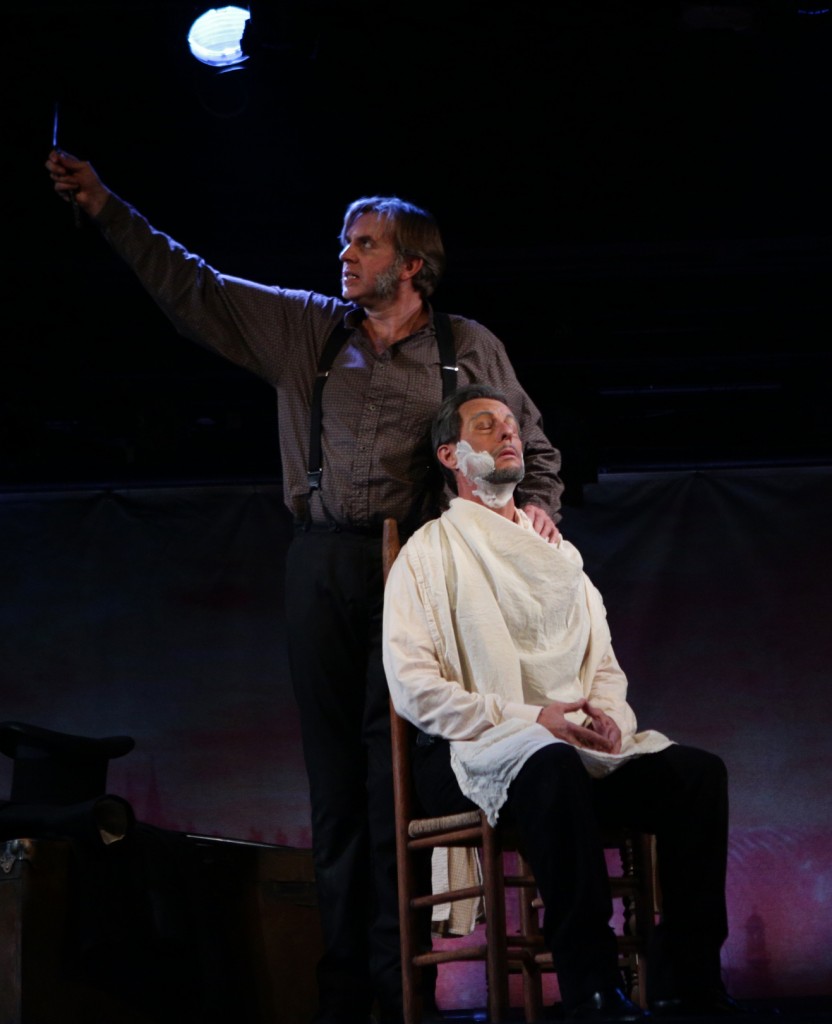
Photo by Mark S. Howard. Christopher Chew, Paul C. Soper.
Presented by the Lyric Stage of Boston
Music and Lyrics by Stephen Sondheim
Book by Hugh Wheeler
Directed & Staged by Spiro Veloudos
Music Director, Jonathan Goldberg
Sept. 5 – Oct. 11, 2014
140 Clarendon Street
Boston, MA 02116
Lyric on Facebook
Review Gillian Daniels
(Boston, MA) In today’s entertainment landscape, probably the most surprising thing about The Lyric Stage’s production of Sweeney Todd: The Demon Barber of Fleet Street is how un-sexy it makes murder. No, grisly death probably shouldn’t be attractive as a rule, but television shows like Hannibal and Dexter and even some thriller novels give serial killers a stylized warmth. Blood is splashed artfully over plastic tarps and cannibalized flesh is prepared with exquisite attention to detail for unsuspecting dinner guests. Stephen Sondheim’s infamous musical gives us only Sweeney Todd’s icy vengeance, spinning more out of control with every throat he slits in his barber’s chair, and Mrs. Lovett’s questionable baking skills.
Christopher Chew’s Sweeney is a listless ex-con who has found his way back to Victorian London thanks to the naïve and suitably-named sailor, Anthony Hope (Sam Simahk). Judge Turpin (Paul C. Soper) and The Beadle (a delightful Remo Airaldi) sent Sweeney Todd away on trumped up charges when he was a young man with a family. Now back in Count of Monte Cristo fashion, Sweeney vows to take his bloodlust out on them and everyone who gets in his way, even if it’s an innocent beggar woman (played with finesse by Lisa Yuen). Sweeney utilizes the help of the maternal bakery-owner, Mrs. Lovett, a performance by Amelia Broome that balances an apple-cheeked sweetness with a thrifty eye. As Sweeney Todd’s body count grows, Mrs. Lovett’s meat pie business begins to boom. Meanwhile, in one of the musical’s many wild coincidences, Hope has fallen in love with the syrupy Johanna (Meghan LaFlam), Sweeney Todd’s teenage daughter.
Director Spiro Veloudos’ production of the cannibalistic musical is less a dark comedy than a full-blown tragedy with some gallows’s humor sprinkled through out. The world here is one painted in shadow. No man of authority is to be trusted, certainly not the ludicrously lecherous Judge Turpin (though Soper’s performance is strangely muted) and his intentions toward his ward. Some details of this bleak setting fade into the background, however, like nightingales for sale that sing beautifully because they have been blinded. Even Mrs. Lovett innocently purchases a harmonium leftover from a chapel fire. If there’s any whimsy to be found in this melodramatic version of London, pulled straight out of pulp novels and tabloids, it’s the dark cartoonishness of its reality. The songs in Sondheim’s infamous minor key add to the vortex of sorrow.
Though I love the play’s grim sadness, I’ve never been overly fond of the individual songs or the moral certainty of the story. Johanna is all Disney princess until she’s forced into a corner and The Beadle appears to have no conscience to spare. People are either convinced of their own goodness or delight in their own cruelty. Those with innocent intentions, like the young waif, Toby (Phil Tayler), don’t remain innocent forever. Here, as in the best song of the musical, “A Little Priest,” one must eat or be eaten, and, indeed, by the final act, most of the characters are set up with a throat ready to be cut.
